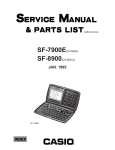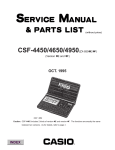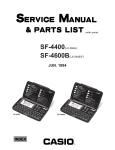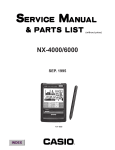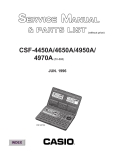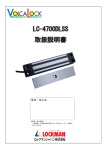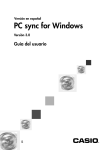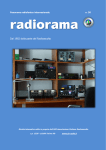Download Casio SF-4700L Specifications
Transcript
(without price) SF-4700L (ZX-454 A,B) SF-4900L (ZX-454 E,F) JUL. 1997 SF-4700L R CONTENTS 1. SPECIFICATIONS ............................................................................................................ 3 2. GENERAL GUIDE ............................................................................................................. 5 3. BATTERY REPLACEMENT ............................................................................................. 8 4. RESET OPERATION ........................................................................................................ 9 5. TO SAVE THE DATA ...................................................................................................... 10 6. PIN FUNCTION ............................................................................................................... 12 7. DIAGNOSTIC PROGRAM .............................................................................................. 13 8. ERROR MESSAGE .........................................................................................................17 9. SCHEMATIC DIAGRAMS ...............................................................................................19 10. EXPLODED VIEW ...........................................................................................................21 11. PARTS LIST ....................................................................................................................22 —2— 1. SPECIFICATIONS Memory Capacity Memory capacity differs according to model. The following shows the memory capacity for each available model. Model Memory SF-4700L 64K bytes SF-4900L 128K bytes The following shows the number or items that can be stored in each model (SF-4700L/4900L). Telephone Directory Approximately 2900 (SF-4700L)/6000 (SF-4900L), under the following conditions: 8-character name 10-character telephone number Approximately 1400 (SF-4700L)/3000 (SF-4900L), under the following conditions: 8-character name 10-character telephone number 20-character address Memo Approximately 2700 (SF-4700L)/5700 (SF-4900L), 20-character memos. Schedule Keeper Approximately 1800 (SF-4700L)/3800 (SF-4900L), under the following conditions: 1 item per day, 20 characters per item 30 days per month Starting time specified,alarm time set Approximately 2100 (SF-4700L)/4500 (SF-4900L), under the following conditions: 1 item per day, 20 characters per item 30 days per month Starting time specified, no alarm time Reminder Approximately 3600 (SF-4700L)/7400 (SF-4900L), under the following conditions: 10 characters per item Alarm time set Approximately 4000 (SF-4700L)/8400 (SF-4900L), under the following conditions: 10 characters per item No alarm time Main Modes: Telephone Directory, Memo, Schedule Keeper, Reminder, Calendar, Home Time, World Time and Calculator Data Storage: Storage and recall of telephone, memo, schedule, reminder data; calendar display; secret area; editing; memory status display Clock: Worldtime; reminder alarm; schedule alarm; daily alarm; accuracy under normal temperatures: average ±3 seconds per day Calculation: 10-digit arithmetic calculations; arithmetic constants (+, –, ×, ÷); independent memory; percentages; square roots; 20-digit approximations; date calculations; other mixed calculations —3— General: Display element: 16-column × 4-line LCD Main component: LSI Power supply: Three lithium batteries (CR2032) Current consumption: Telephone top menu (Backlight from EL doesn't shine)600 µA (MAX.) Telephone top menu (Backlight from EL shines)12.6 mA (MAX.) OFF- 19 µA (MAX.) Low battery message: 7.2 V ± 2.5% Forced power off: 6.7 V ± 2.5% Battery life: • Approximately 300 hours of continuous display only in Telephone Mode. • Approximately 170 hours with 55 minutes of continuous display only and 5 minutes of processing operation per hour. • Approximately 110 hours with 55 minutes of continuous display only and 5 minutes of processing operation per hour, plus 3 minutes of backlight operation per hour during continuous display only period. Power consumption: Auto power off: 0.2 W Approximately 6 minutes after last key operation Operating temperature: 0 °C ~ 40 °C (32 °F ~ 104 °F) Dimensions: Unfolded: Folded: 11 H × 152.5 W × 181.5 D mm (3/8" H × 6" W × 71/8" D) 15 H × 152.5 W × 93 D mm (5/8" H × 6" W × 35/8" D) Weight: 138 g (4.9 oz) including batteries —4— 2. GENERAL GUIDE The following illustration shows the names of the main controls of the SF-4700L/4900L. Display Mode Keys Power OFF Key Power ON/ Clear key Numeric Keys Cursor Keys Connector Terminal Light key Keyboard Lock Setting Up the SF Unit After batteries are loaded, use the following procedures to set up the SF Unit for operation. To switch power on and off 1. Press ON to switch power on. • The initial screen for the mode that was seleted when you last switched power off appears on the display. • lf either of the messages (A or B) shown bellow appears on the display, follow the procedures described bellow. Whenever you turn on the power of the SF Unit ,it performs a self-check before beginning operation. If a problem is discovered during the self-check, the SF Unit displays one of the following messages. Note • The above messages always appear in English, regardless of the system language setting. If this is the first time you ever turned on the SF Unit... Perform the RESET OPERATION on page 9. If this is not the first time you are using the SF Unit... There is probably a problem with the data in memory (data error). Note that once data is lost it cannot be recovered. Such data errors are generally caused by one of the following problems. • Interruption of battery power. • Severe electrostatic charge, impact, change in temperature, or change in humidity. • Hardware problem. —5— After a data error is discovered, you will not be able to input or edit data. In order to return memory to normal (allowing further input and editing of data), you must perform the RESET operation to clear the memory of all data. Before doing so, you may want to recall important data and write it down (if you don't already have a copy). You can then re-input the data after clearing the memory. The RESET procedure you should use depends on the type of message error message on the display. "ARE YOU USING A NEW UNIT FOR THE FIRST TIME ?" 1. Make sure that NO is highlighted and then press set. If YES is highlighted, press to move the highlighting to NO and then press SET. • The message "DATA ERROR ! CHECK YOUR USER'S GUIDE FOR PROCEDURE !" appears on the display at this time.After this message appears, you can press CLEAR to clear it from the display and recall data in order to make a back-up record of it before continuing. 2. Press the RESET button, which is located inside the battery compartment cover on the back of the unit. • This causes the "CLEAR MEMORY AND SET UP THE UNIT FOR OPERATION ?" message to appear on the display. 3. Press to move the highlighting to YES and then press SET to reset the uint. • Highlighting NO and pressing SET clears the reset message and displays the Home Time screen. "CLEAR MEMORY AND SET UP THE UNIT FOR OPERATION ?" 1. Make sure that YES is highlighted. If OFF is highlighted, press to move the highlighting to YES. • Highlighting OFF and pressing SET turns off the unit without resetting the unit. 2. Press SET to reset the unit. If you still have trouble after trying the RESET operation, you may have a hardware problem. • lf a low battery power message appears on the display or if the display remains blank when you turn power on, replace batteries as soon as possible. 2. press OFF to switch power off. About Auto Power Off function... The SF Unit is equipped with an Auto Power Off function that switches power off automatically whenever you do not perform any key operation for about six minutes. To restore power, press ON. To turn on the EL backlight There are two ways to turn on the backlight of the display. Pressing LIGHT causes the backlight to turn on for about 15 seconds, and then turn off automatically. Pressing SHIFT and then LIGHT also turns on the backlight, but in this case the backlight stays on as long as you keep performing key operations on the SF Unit . The backlight turns off automatically if you do not perform any key operation for about 15 seconds. Leaving the backlight on for long periods greatly reduces battery life! You can manually turn the backlight off by pressing LIGHT again. Failure of the backlight to turn on indicates low battery power. Replace batteries as soon as possible. —6— To adjust the display contrast 1. • 2. 3. Enter the Telephone Directory Mode. You could enter any mode except the Calculator mode here. Press SHIFT CONT. Use the and keys to adjust the contrast. 4. After you are finished, press ESC to clear the contrast abjustment display. To select a mode Press one of the mode keys to select the mode you want. TEL Telephone Directory mode for storage of telephone numbers, name, addresses, and six user-definable entries. MEMO Memo mode for storage of unformatted data in a kind of electronic notebook. SCHEDULE Schedule Keeper mode for storage of appointments scheduled for specific dates and times, and setting of Schedule Alarms to remind you of your appointments. CALENDAR Displays any monthly calendar from January 1901 through December 2099. HOME/WORLD Home Time/World Time modes for display of the current time in your hometown and other locations around the globe. For example, you can set New York as your home time and London as the world time. REMINDER Reminder mode to create reminders and alarms for annual, monthly, and daily events. CAL Calculator mode for basic calcuations with the touch of a key. To check the memory status Press SHIFT and then hold down CAPA to display a screen that shows the current memory status. To clear the memory status display, release CAPA. You can enter any mode except the calculator Mode and Home/World Time Mode here Remaining memory capacity Total number of characters stored in memory Note The screen example shown here is the SF-4900L. The capacity values(FREE and USED total) is different on the SF-4700L display. —7— 3. BATTERY REPLACEMENT Before replacing the batteries, note the following precaution: • Be sure to replace all batteries with a full set of new ones, and do not mix old batteries with new ones. 1. Press OFF to switch power OFF. 2. Slide the battery compartment cover in the direction indicated by the arrow. +3 2 + 1 + 3. Slide the battery switch to the "REPLACE 1" setting. REPLACE +3 3 2 1 2 + 1 + NORMAL 4. Remove the battery holder by sliding it in the direction indicated by the arrow in the illustration. Caution Be sure to remove only one battery at a time. Otherwise, you will lose all data stored in memory. 5. Replace the old battery with a new one, making sure that the positive (+) side of the new battery is facing up (so you can see it). 6. Replace the battery holder and faten it in place. 7. Slide the battery switch to the "REPLACE 2, 3" setting and repeat steps 4 through 6 for the other batteries. • Be sure to replace all three batteries, using CR2032 lithium batteries only. Never mix old batteries with new ones. 8. Slide the battery switch to the "NORMAL" setting. • You will not be able to turn the unit on if the battery switch is not in the "NORMAL" setting. 9. Replace the battery compartment cover. • The Home Time screen always appears whenever you turn power on for the first time after replacing batteries. 10. Check the Home Time setting and make changes if necessary. —8— 4. RESET OPERATION Warning! The following procedure erases all data stored in the memory of the SF Unit. Perform the following operation only when you want to delete all data and initialize the settings of the SF Unit. Remember-you should always keep copies of important data by writing it down, by transferring it to another SF-4700L (SF-4900L). To reset the SF Unit's memory 1. Press ON to switch power on. 2. Open the battery compartment and press the RESET button. +3 2 + RESET button 1 + • At this time the following message appears on the display. CLEAR MEMORY AND SET UP THE UNIT FOR OPERATION? YES/NO 3. Make sure that YES is highlighted. If NO is highkighted, press to move the highlighting to YES. Warning! The next step deletes all data stored in the SF Unit's memory. Make sure that you really want to delete the data before you continue! 4. Press SET to start the RESET procedure. • After the RESET operation is complete, the LANGUAGE screen appears on the display. 5. Select a system language. • After you set the system language, the Home Time Screen appears. 6. Check the Home Time setting and make changes if necessary. Following the reset operation described above, the Home Time display appears and the SF Unit settings initialized as noted below. Home Time: World Time: Daily Alarm: Sound: Messages: Character input: LON JAN/1/1998 THU 12:00 AM 12-hour format NYC 12:00 PM Schedule alarm — ON Reminder alarm — ON Daily alarm — OFF Key — ON English CAPS —9— 5. TO SAVE THE DATA SF-4700L/4900L can transfer the customer's data to another SF-4700L/4900L with memory protection only when replacing the LCD or the outer case. To connect SF-4700L (4900L) to another SF-4700L (4900L)CSF Unit 1. Make sure that the power of both units are switched off. 2. Remove the covers from the data communications jacks on the two SF-4700L (4900L). 3. Connect the two units using the SB-62 cable. How to transfer the data In the following explanations, Unit 1 refers to the transmitting Unit whereas Unit 2 refers to the receiving Unit. STEP OPERATION DISPLAY Press [ON] button on Unit 2. Mode display before power off 1 2 Press RESET button on Unit 2. Press [SET] button on Unit 2. CLEAR MEMORY AND SET UP THE UNIT FOR OPERATION ? YES/NO After displaying ALL RESET ! ✼LANGUAGE(1-5)✼✼ 1 DEUTSCH 2 ENGLISH 3 ENPANOL 3 4 Press [SET] button on Unit 2. 5 Press [CAL] button on Unit 2. WATCH mode display 0 6 Press [1], and then [TIME DATE] button on Unit 2. 1901/ — 10 — NOTE STEP 7 8 OPERATION DISPLAY NOTE Press [2] and then [TIME DATE] button on Unit 2. Press [3] and then [M+] button on Unit 2. 1901/ 2/ M SUN 1901/ 2/ 3 9 10 11 12 13 14 15 16 17 Press [TEL] button on Unit 2. Press [ON] button on Unit 1. 19 Mode display before power off Press [TEL] button on Unit 1. Press [FUNC] button on both Unit 1 and Unit 2. Press [FUNC] button on both Unit 1 and Unit 2. Press [4] button to select "4 DATA COMM"on both Unit 1 and Unit 2. Press [2] button to select "2 RECEIVE"on Unit 2. Press [1] button to select "1 SEND" on Unit 1. Press [3] button to select "3 ALL DATA" on Unit 1. TEL mode display X X X 4 X 2 3 4 1 2 3 ITEM EDIT ITEM DELETE ITEM COPY SOUND TO SECRET ALL DELETE LABEL EDIT DATA COMM SEND RECEIVE SET UP PAR. RECEIVE DATA TO STOP PRESS(ESC) 1 ONE ITEM 2 MODE DATA 3 ALL DATA -SENDSEND ALL DATA ? Set SET UP PAR to PARITY N, BIT LENGTH 7 and BPS 9600 on Unit1. SET / ESC Press [SHIFT] and then [SET] button on Unit 1. 18 TEL mode display Unit 1 : SENDING Unit 2 : RECEIVE OK Within a few minutes, both Units display become TEL mode. Confirm the data displayed on Unit 2. — 11 — Data transmission completed 6. PIN FUNCTION CPU µPD3058Ap-009 : COB (Chip on Board) NOTE: The CPU is bonding on the PCB. If the CPU is defective, replace the PCB ASSY (A140745) because the CPU cannot be replaced. Pin No. Pin Name 1 CSRA1 2 CSRA2 4 WEB 5 ~ 21 RA16,RA15,A14 ~ A0 22 ~ 29 IO7 ~ IO0 30 ~ 45 KY15 ~ KY0 46 SW 48 DN 50 SOUTB 51 SIN 52 VDD 53 TEST 54 VTM 55 OSC0 56 OSC1 57 GND 58 ~ 61 V4 ~ V1 62 INT0 63 STNT 64 VLCD 65 ~ 160 S95 ~ S0 161 ~ 193 C32 ~ C0 194 GND 195 BZ1 196 BZ2 197 VDD Input/Output O O O O I/O I I O O I I — O I O — O I I I O O — O O I — 12 — Function Control for EL driver Chip selecting signal for RAM Write enable signal for RAM Address bus Data bus Key input signal Detection signal for battery cover Serial data output Control for serial data output Serial data input Power supply to digtal circuit TEST terminal Voltage for the intenal circuit of CPU Clock for CPU Clock for CPU GND Bias voltage to LCD Control for forced power off Control for VLCD Power supply to LCD LCD driver signal (common) LCD driver signal (segment) GND Buzzer signal output Buzzer signal output Power suply to digital circuit 7. DIAGNOSTIC PROGRAM CAUTION:Performing this program, data saved in the Unit are disappeared (erased). Save these data to another SF-4700L(4900L) referring to 5. TO SAVE THE DATA. 3 2 Test Pad 1 Reset Button Bottom View To enter the diagnostic program, proceed as follows; 1 : Turn the power off, and then remove the battery cover. 2 : Press the power switch [ON] button while shorting the Test pad. STEP 1 OPERATION Press [ON] while shorting the Test pad. Press [set] button. 2 3 Press [1] button to select "1 DISP". 4 Press [1] button to select "1 WHITE". 5 Press [2] button to select "2 BLACK". 6 Press [3] button to select "3 CHECK". 7 Press [4] button to select "4 RVS". 8 Press [5] button to select "5 FRAME". 9 Press [6] button to select "6 DOT4". Press [ESC] button. 10 DISPLAY SELF TEST PROG. PRESS SET KEY QUIT BY OFF CASIO FEB 1996 TEST 2 MEMORY MENU 3 KEY 4 BUZZER 1 DISP 5 I/F DISP 4 RVS 1 WHITE 3 FRAME 2 BLACK 4 DOT4 3 CHECK 5 TIME NOTE Press [OFF] button at this step, data saved in the Unit are not disappeared (erased). Main menu Display Check All dots off TEST MENU 1 DISP — 13 — 2 3 4 5 MEMORY KEY BUZZER I/F Main menu STEP 11 12 13 OPERATION Press [2] button to select "2 MEMORY". NOTE 3 WR2 4 READ2 1 WR1 5 DUMP 2 READ1 6 CHKSUM Press [1] button to select After displaying RAM WRITE1; "1 WR1". MEMORY 3 WR2 4 READ2 1 WR1 5 DUMP 2 READ1 6 CHKSUM After displaying EXECUTING!! Press [2] button to select "2 READ1". COMPLETE ! ! ✼✼ KB MEMORY Press [ESC] button. MEMORY Press [6] button to select "6 CHKSUM". 1 WR1 2 READ1 For example, TY SZ FE 0 128 Press [ESC] button. MEMORY 14 15 DISPLAY 16 Press [ESC] button. 17 Press [LIGHT] button. 18 19 Press [3] button to select "3 KEY". 20 Press [2] button to select "2 AUTO". 3 4 5 6 1 DISP TEST MENU 1 DISP KEY Check the SUM value SUM 2C9D XOR C7 21 Main menu Make sure that the backlight turns on. Key Check No display The following numbers will be shown. 7, 8, 9, / 4, 5, 6, * 1, 2, 3, – 0, ., =, + ON, OFF, TEL, MEMO HOME, CAL, TIME, NEXT DISP, LIGHT REMINDER, SCHEDULE CALENDAR, SECRET SMBL, DEL SF-4700L indicates "64KB" SF-4900L indicates "128KB" WR2 READ2 DUMP CHKSUM 3 WR 2 4 READ 2 5 DUMP 6 CHKSUM 2 MEMORY 3 KEY 4 BUZZER 5 I/F 2 MEMORY 3 KEY 4 BUZZER 5 I/F 1 RANDOM 2 AUTO 1 WR 1 2 READ 1 TEST MENU Memory Check 00 04 08 12 16 20 24 01 05 09 13 17 21 25 02 06 10 14 18 22 26 03 07 11 15 19 23 27 28 29 30 31 — 14 — The display shows four lines at a time and the rest of the numbers are scrolled. Press the buttons in order. If a wrong button is pressed, a buzz sound STEP 21 OPERATION SEARCH, LEFT CURSOL KEY UP CURSOL KEY DOWN CURSOL KEY RIGHT CURSOL KEY ESC, Q, W E, R, T, Y U, I, O, P CAPS,SHIFT, Z, X D, F, G, H J, K, L, RETURN FUNC, SHIFT, Z, X C, V, B, N M, SPACE Press [set] button. Press [LIGHT] button. 23 25 32 Press [4] button to select "4 BUZZER". 34 35 36 37 38 39 40 44 48 52 56 60 64 42 46 50 54 58 62 66 69 43 47 51 55 59 63 67 41 45 49 53 57 61 65 68 After displaying 68 1 DISP TEST MENU 1 DISP BUZZER Press [2] button to select "2 ALARM". NOTE 33 TEST MENU 22 24 DISPLAY 2 3 4 5 2 3 4 5 1 2 3 69 70; MEMORY KEY BUZZER I/F MEMORY KEY BUZZER I/F BEEP ALARM 1 ALARM 2 EXECUTING ! ! Press [ESC] button. BUZZER 1 BEEP 2 ALARM 1 3 ALARM 2 Press [ESC] button. TEST MENU 2 3 4 5 26 27 1 DISP Main menu Make sure that the back light turns off. Make sure that the buzzer sounds. Alarm stops. MEMORY KEY BUZZER I/F Prepare one more unit of SF-4700L (or SF-4900L) and connect both units with cable SB-62 then put newly prepared unit on the check mode. In the following explanations, Unit 1 is checking uint whereas Unit 2 is newly prepared unit. 28 Press [5] buttons on the both Unit 1 and Unit 2 to select "5 I/F". 1 2 3 4 I/F 7N9 — 15 — TRANS RECEIV ASCII LOOP STEP 29 OPERATION DISPLAY Press [1] buttons on Unit 1 to select "1 TRANS". NOTE Ready to transmit EXECUTING ! ! Press [2] buttons on Unit 2 to select "2 RECEIVE". Unit 1 indicates "EXECUTING". During the transmission 30 Unit 2 shows scrolling HHHHHH. 31 32 Press [ESC] button on Unit 1. Transmission completed TRANS BREAK ! ! Press [ON] button on Unit I/F 1 and 2. 1 2 3 4 7N9 33 Press [1] button on Unit 2 to select "1 TRANS". TRANS RECEIV ASCII LOOP Ready to transmit EXECUTING ! ! Press [2] buttons on Unit 1 to select "2 RECEIVE". Unit 1 shows scrolling HHHHH. During transmission 34 Unit 2 indicates "EXECUTING". Press [ESC] on Unit 2. TRANS BREAK ! ! 35 36 37 Transmission completed 1 2 3 4 Press [ON] button on Unit I/F 1 and 2. Push RESET button on Unit 1 TRANS RECEIV ASCII LOOP Indicates the TEL menu Press [OFF] button. Check program completed 38 — 16 — 8. ERROR MESSAGE Message Meaning Action NO DATA! Search operation attempted when no Current search operation cannot data is stored in memory. be performed. NOT FOUND! Data specified in search operation does not exist in memory. Change specification or cancel search. MEMORY FULL! No more room in memory for storage of data. Delete unnecessary data items from memory. ALARM TIME ALREADY USED! Attempt to set a Schedule Keeper or a Set different alarm time or change Reminder alarm time that is already the existing alarm time to another used for another entry. one. ALARM TIME ALREADY PASSED! Attempt to set a Schedule Keeper alarm time for a time / date that is already passed. Set different alarm time (for a future time/date). SECRET DATA! Alarm for a secret memory area data item is sounding. Enter the secret memory area to veiw details of the alarm. PASSWORD MISMATCHI! Attempt to enter the secret memory area using a password that does not match the one preset for the secret area. Use the correct password. TRANSMIT ERROR! Error during data communications. Cancel the data communications operation and try again. DATA ERROR! CHECK YOUR USER'S GUIDE FOR PROCEDURE! Data corrupted by strong impact, electrostatic charge, etc. See page 5 ~ 6 of this manual. ARE YOU USING A NEW UNIT FOR THE FIRST TIME? YES/NO This is the first time you have turned the power on after purchasing the unit. CLEAR MEMORY AND SET UP THE UNIT FOR OPERATION? YES/NO Data corrupted by strong impact, electrostatic charge, etc. See page 5 ~ 6 of this manual. WEAK BATTERIES! CONSULT YOUR USER'S GUIDE IMMEDIATELY! The batteries are getting weak. Replace batteries immediately (page 8). — 17 — 9. SCHEMATIC DIAGRAMS Main Block Model name RAM CAPACITY LSI2 LSI3 LSI4 CB1 CB2 CB3 IC4 IC7 × × SF-4700L 64KB used SF-4900L 128KB × × × × × × × not used — 19 — Key Block — 20 — 10. EXPLODED VIEW 6 12 1 2 11 3 19 7 EL 14 13 4 9 15 BZ1 5 18 16 20 8 17 10 — 21 — 11. PARTS LIST N N N N N N N N N N N N N N N N N N N N N N N N N N N N N N Item Code No. Parts Name LCD ASSY 6420 6170 HEAT SEAL 3335 6617 LCD PCB ASSY LSI2, 3 2012 3192 LSI/S-RAM LSI4 2012 1659 LSI/S-RAM X1 7110 0642 OSCILLATOR/QUARTZ JCI 3501 6538 JACK IC2 2105 5516 IC/MOS IC3 2105 1568 IC/MOS IC4 2105 4543 IC/MOS IC5 2101 1142 IC/MOS IC6 2105 3269 IC/MOS IC7 2105 1561 IC/MOS IC8 2113 0374 IC/MOS IC9 2105 6385 IC/MOS IC15 2105 1120 IC/MOS Q1 2259 0959 TRANSISTOR/DIGITAL D1 2390 0847 DIODE/SCHOTTKY D2 2390 0364 DIODE/SCHOTTKY 3 6420 6490 LCD ASSY 6420 8020 ELECTRO LUMINESCENCE EL 4 6420 6160 SPRING/BATTERY 5 6408 9410 SPRING/BATTERY COMPONENTS 6 6420 6150 PANEL/DISPLAY 6 6420 6300 PANEL/DISPLAY 6 6420 6350 PANEL/DISPLAY 6 6420 6400 PANEL/DISPLAY 7 6420 6080 CASE/UPPER 8 6420 6130 KNOB 9 6512 6040 CAP BZ1 3122 2380 BUZZER 10 6420 6210 HOLDER/BATTERY 11 6420 6181 LABEL 11 6420 6311 LABEL 11 6420 6361 LABEL 11 6420 6411 LABEL 12 6420 6100 HARD COVER 12 6420 6290 HARD COVER 12 6420 6340 HARD COVER 12 6420 6390 HARD COVER 13 6420 6110 RUBBER/CONTACT 14 6420 6050 PCB ASSY 14 6420 6330 PCB ASSY 15 6410 0150 SPRING/CONTACT 16 6420 6120 KNOB 17 6420 6140 COVER/BATTERY 18 6410 0170 RUBBER/KEY 19 6420 6220 CUSHION Parts prices will be informed separately by Parts Price List. 1 2 Notes: Quantity 4700L 4900L A B E F R A341754-1 CD1126-TN(A) 1 1 1 1 1 1 1 1 B B TC55257DFL-7085V TC551001BFL-10V(S) DT-26S HSJ1169-012010 TC7W126FU-TE12L TC7S32F-TE85R TC7W32F-TE12L TC7W02F-TE12L TC7W74F-TE12L TC7S04F-TE85R D353-C RH5RL53AA-T1 TC7S08F-TE85R DTC114YKT-146 MA718-(TX) MA713-TX A341805B*1 C C442109-1 A341753-1 C311911-2 2 0 1 1 1 1 1 1 1 1 1 1 1 1 1 1 1 1 3 3 2 0 1 1 1 1 1 1 1 1 1 1 1 1 1 1 1 1 3 3 0 1 1 1 1 1 0 1 1 0 1 1 1 1 1 1 1 1 3 3 0 1 1 1 1 1 0 1 1 0 1 1 1 1 1 1 1 1 3 3 B B C C C C C C C C C C C C C C B B X X A341745-1 A341745-2 A341745-3 A341745-4 A140694-1 A240986-1 C311730-1 EFB-S55C41A8 A442731-1 A442722A-1 A442722A-2 A442722A-3 A442722A-4 A140696-1 A140696-2 A140696-3 A140696-4 A140697-1 A140745*1 C A140745*2 C C412167-2 A240985-1 A240987-1 C311028-3 A442763-1 1 0 0 0 1 1 1 1 3 1 0 0 0 1 0 0 0 1 1 0 1 1 1 1 1 0 1 0 0 1 1 1 1 3 0 1 0 0 0 1 0 0 1 1 0 1 1 1 1 1 0 0 1 0 1 1 1 1 3 0 0 1 0 0 0 1 0 1 0 1 1 1 1 1 1 0 0 0 1 1 1 1 1 3 0 0 0 1 0 0 0 1 1 0 1 1 1 1 1 1 B B B B X C C C C X X X X X X X X C B B C C C C C Specification B: A: F: E: N – New parts Q – Quantity used per unit R – Rank — 22 — SF-4700L B.O.S.S SF-4700L Others SF-4900L B.O.S.S SF-4900L Others R–A: B: C: X: Essential Stock recommended Others No stock recommended N Item N N 20 20 6420 6090 CASE/LOWER 6420 8350 CASE/LOWER A140695-1 A140695-2 1 made in 1 Malaysia N 20 6420 6280 CASE/LOWER A140695-4 1 made in Japan Notes: Code No. Parts Name N – New parts Q – Quantity used per unit R – Rank Specification B: A: F: E: — 23 — SF-4700L B.O.S.S SF-4700L Others SF-4900L B.O.S.S SF-4900L Others Q Available R–A: B: C: X: A/ E A/ E for U.S.A. B/ F A/ B/ E/ F Essential Stock recommended Others No stock recommended R X X X MA0900671A























